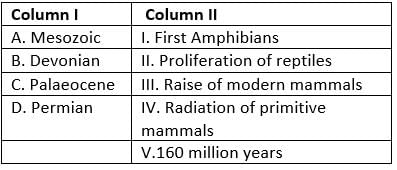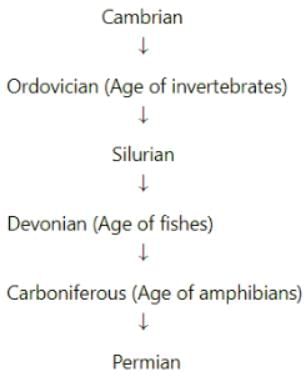Test: Evolution (NCERT) - NEET MCQ
10 Questions MCQ Test Biology Class 12 - Test: Evolution (NCERT)
What is correct arrangement of periods of palaeozoic era in ascending order in geological time scale?
Following is given the diagrammatic representation of evolutionary history of vertebrates through geological periods. Identify the geological periods. Identify the geological periods (A, B, C and D) and select the correct option.


Match column I with column II and select the correct option from the given codes.

The character that proves that frogs have evolved from fishes is
Refer the given statements and select the correct one
(i) Fossils are remains of hard parts of life forms in Rocks
(ii) A study of fossils in different sedimentary layers indicates the geological period in which they live.
(iii) Radio isotopen are often used to determine the age of the fossils
(iv) Study of fossils is called paleontology
Read the given statements (i) - (iv) regarding evolution and select the incorrect ones
(i) The oceanic water rich in mixture of organic compounds was termed by J.B.S. Haldane (1920) as 'hot dilute soap of organic substances'.
(ii) The term coacervate was given by Syndey Fox.
(iii) First cellular form of life appeared approximately 2000 mya on earth.
(iv) The first geological time scale was developed by Georges Cuvier.
Given below are four statements (i) - (iv) regarding geological time scale. Read them carefully.
(i) Palaeozoic era is the era of ancient life
(ii) Ordovician period is the age of vertebrates
(iii) Carboniferous period is the age of reptiles
(iv) Proterozoic era is the era of early life
Which of the above two statements are incorrect?
|
78 videos|277 docs|174 tests
|





















